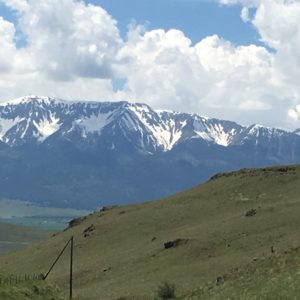The Rhythm of the Seasons
In one of his prayers Reinhold Niebuhr praised God for “the rhythm of the season, a sign of thy providence.”
This Friday is the summer solstice. Many seem to have anointed the Memorial Day weekend as summer’s beginning, but Friday’s the day. In Seattle’s Fremont neighborhood they are traditionalists, holding the Fremont Summer Solstice parade with its fabled nude cyclists this weekend. Actually, few are nude nude. Most sport a fantastic array of body paints.
 Like Niebuhr, I count the seasons as one of God’s good gifts. Spring and summer, fall and winter. Just those words are evocative. (This photo was taken on a bike ride yesterday. I was on the Zumwalt, looking south at the Wallowa range.)
Like Niebuhr, I count the seasons as one of God’s good gifts. Spring and summer, fall and winter. Just those words are evocative. (This photo was taken on a bike ride yesterday. I was on the Zumwalt, looking south at the Wallowa range.)
Twice we have lived in places where the seasons were muted, Hawaii and Arizona. I felt the difference and missed the “rhythm of the seasons” as I had known it. When we first moved to Hawaii I didn’t understand why they even bothered with weather forecasts. Day after day was clear and sunny.
This year, in the Wallowas, June has been drier and warmer than usual. Climate change? I went swimming in Wallowa Lake on June 12. I’m quite sure that’s the earliest I’ve ever been in the Lake, which I’d guess was around 45 to 50 degrees. Pretty darn cold. “Swimming” would be an over-statement for what I did. But the air temperature was in the low 80’s and it felt good.
There have been other changes here as well. August has become a time for wildfire haze and build-ups of smoke that can be oppressive. Without much talking about it, we’ve begun to adjust, coming earlier in June and, at least this year, planning to be back in Seattle much of August. There are other reasons to return then, weddings to attend, doctor’s appointments and the Seattle to Vancouver Bike Ride, but are we adjusting to climate change without quite acknowledging that we are doing so?
I worry about this, about our capacity to adjust, almost unconsciously, to climate change.
I find myself worrying a lot these days about climate change.
The novelist, William Vollmann, has written a two-volume work, Carbon Ideologies. The first volume is titled No Immediate Danger, the second, No Good Alternative. Vollmann starts off by informing readers that he will not offer any solutions to climate change because there are none. It’s too late.
Quite a few of you readers have called my attention to Enlightenment Now: Science, Reason, Humanism and Progress by Steven Pinker. Pinker, a Harvard psychologist, has made a name for himself by telling us that things are far better than we think. He makes a statistically-based case that human civilization has made enormous progress and that life today is for most people better than it has ever been.
William Vollmann verses Steven Pinker; now that is a debate I would like to see.
Another well-known writer on climate and the environment, Bill McKibben, has just published Falter: Has the Human Game Begun to Play Itself Out? McKibben is not the fatalist that Vollman is, but his title clearly tilts more Vollman than Pinker.
I tend to be skeptical of end-of-the-world scenarios. I remember the early 1970’s and the ZPG (Zero Population Growth) movement promoted by the Stanford scientist, Paul Ehrlich, among others. The world’s population is unsustainable. Stop having children. The end is near.
In the 1980’s it was a coming nuclear armageddon that was projected by many, including Jonathan Schell in The Day After. Meaning, the day after a nuclear war. It was a harrowing vision.
But being cautious about doomsday scenarios — perhaps to maintain my sanity — I still find myself worried. Climate change is no “Chinese hoax,” as Trump has claimed. And Ehrlich was right in a sense, there are too many of us, at least living as we do.
In this year’s Pulitzer Prize fiction winner, Overstory, one of Richard Powers central characters is a scientist who is black-balled early in her career for her theory that trees communicate with one another. Subsequently vindicated, she is invited to speak at a conference on what can be done. Her answer to the question is to take her own life at the end of her talk, ingesting some fatal dose. The only answer is a very much diminished human population. Another very dark vision.
My faith not only teaches me to regard the natural world with reverence and awe, it also leads me to believe that what we consider the end isn’t — not with God. Such faith, can of course, be pollyanna-ish, a handmaid of denial. But it may also make it possible to continue, to make changes, to press for action and to hope.
That “rhythm of the seasons” is a sacred gift. As is the creation. I hope and pray it is one my grandchildren, and theirs, will inherit and enjoy.
![Anthony B. Robinson [logo]](https://www.anthonybrobinson.com/wp-content/themes/anthonybrobinson/images/logo.png)
![Anthony B. Robinson [logo]](https://www.anthonybrobinson.com/wp-content/themes/anthonybrobinson/images/logo-print.png)